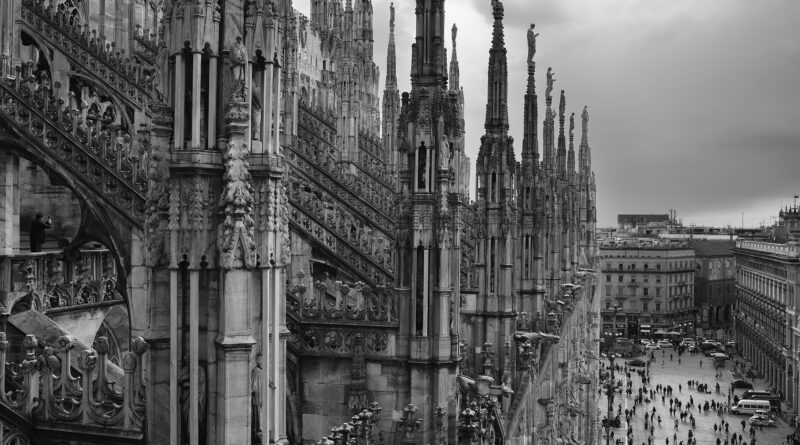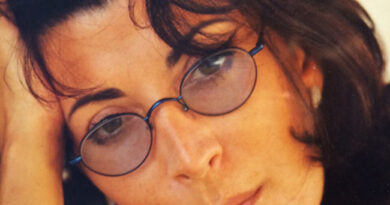Davide Amante interview on the World Cities Culture Forum
Milan to host World Cities Culture Summit 2020, interview with the novelist Davide Amante to better understand the value of this announcement.
The city of Milan will host the World Cities Culture Summit in October 2020. We asked the novelist Davide Amante, living in Milan, to better explain this initiative, his point of view on the administration of the city and the opportunities it represents. Cultural leaders from around the world have been sharing practical policies and actions that can ensure culture and creativity can thrive and contribute to the continued success of their cities. Milan has been chosen to host next year’s summit due to its diverse population, cultural vibrancy and its role as a leading city for cultural workers.
We meet in the novelist’s attic in the very center of Milan, from where there is already an impressive visual representation of the city: from the Duomo of Milan to the ancient domes of the churches to the modern glass skyscrapers of the most recent parts of the metropolis.

Do you agree with the decision to host the World Cities Culture Summit in Milan?
Yes, definitely. In my opinion it is a deserved and relevant choice for the city of Milan. The World Cities Culture Summit is a singular event: originally wanted by the mayor of London, it managed over the years to involve over 40 of the world’s most active and culturally engaged cities. So we are already talking about the excellence of world culture – as expressed by the cities – and the fact that Milan has been chosen for 2020 Summit is even more significant considering the competitors. It must also be said that it is a network of metropolises that collaborate, therefore it should not be seen as a real competition, rather a common sensitivity and attention to the theme of culture and creativity, in the broadest sense.
Why was Milan chosen?
Because Milan is vital, exuberant, intense. Sometimes even rude, as often happens when there is great vitality. But I see a committed Milan, which moves forward with confidence, generous, bearer of solid civic values, and which is constantly changing. And where there is movement, there is always poetry
Do you think the Milan Universal Expo 2015 led to this appointment?
No, I do not think so. It is right to cite it as a flywheel because the Expo gave a big and necessary shock to Milan, involving everyone, even the skeptics. And certainly this push has also reverberated extensively on culture. But culture and creativity have always been part of Milan in its history and despite the somewhat superficial and frivolous opinion that some have of a city that revolves almost excluysively around money, those who know Milan also know that it has always traveled on cultural and creative coordinates of the highest level. The difference, if anything, is that the city has always wanted to combine economic interest and business with creativity, and in my opinion this is right.
Expo 2015 has perhaps highlighted Milan’s commitment to culture in the wider international context of these recent years. But the culture and creativity of Milan are quite another thing, they must be seen in a much broader historical context. And this without taking anything away from the Milanese administration that has done well in my opinion.
Your conclusion leads directly to the next question: do you think the Milan administration helped obtain this appointment?
Yes, I think the administration of recent years has done well. Milan has always had a moderate tradition that, without wishing to enter into political discussions that have little to do with me, has proved to be industrious and effective. I find that the current mayor Giuseppe Sala, with his team, and especially the Culture councilor Filippo del Corno, have worked well in the interest of the city in these years. I think this is a good time for Milan, all things considered.
Can you explain to us what cultural characteristics make Milan worthy of hosting the Summit?
Milan is a Renaissance city that, despite what many may think, has always focused on culture, art and creativity. In Italy there is a tendency to see culture and art as something constituted and complete, after all the many art cities of our country and Rome itself are saturated with art and unfortunately there is often a tendency on the part of many to recognize as art, only that which comes from the past and which has already been recognized by others. Art, on the other hand, is innovative, breaks the rules of the past to create new ones, true art never follows the rules because it creates its own rules, and is almost always confusing for contemporaries who face it the first time. I am thinking of the Arte Povera movement (born in Turin but immediately understood and relaunched above all from Milan), I am thinking of the Transavanguardia movement, music, the great tradition of illuminated Milanese publishing, unfortunately disappeared, I think of that multitude of specialized and refined artisans who have always found in Milan an exceptional client, willing to spend and invest, I think of the exceptional phenomenon of fashion itself.
Giving Milan that role of financial capital, although technically understandable, means not having understood anything about the Milanese and Milanese families. It is precisely when we have the financial availability that we understand that without curiosity, without the soul, without the dream to give a direction, money would lead nowhere to boredom. For this reason, it is precisely in a metropolis as rich as Milan that the need to surround yourself with art and culture can be understood more than anywhere else and just like in any other metropolis of the world.
Milan has always been a Renaissance city in the sense that culture and creativity – not that of the past but that of the future – have always been in its ropes. Milan is a great capital of Italian creativity and soul, often never recognized enough for this.
You are a writer and screenwriter, how do you see Milanese literature?
When there are no longer large publishers willing to take risks and able to understand literature, administrators and newsrooms remain, and this is not good because you risk filling bookstores with a forest of small ideas represented by small stories and with a small literary competence. In recent years, however, the Milanese publishing tradition is finally reborn with many small but very aggressive and quality-conscious publishers. I think this publishing should also be supported with cultural initiatives that fit well into the broader framework of the World Cities Culture Summit 2020.
How do you see the role of women in this modern, culturally sensible, Milan?
This matter of equality in the roles and powers of man and woman, I see it completely out of time, ridiculous. The problem should not even exist anymore and instead, unfortunately, there are still people convinced that there is some qualitative difference. Mediterranean countries have a tendency to suffer a little more of this ignorance and inequality. However Milan has the advantage of being a modern city projected globally, it is a city that has little time for prejudices and looks forward to results, consequently Milan knows well that there is no difference. In fact, I’d rather see more women in key roles than men, I tend to trust women more.
You live in a central, historical area of the city, how is the quality of life?
The quality of life is high and in recent years I have seen a continuous tendency towards improvement. Compared to other cities in the world, Milan has a unique balance. The city manages to maintain a dialogue and a human dimension, while running and working internationally. It is a refined mechanism that the other metropolises, although sometimes more efficient, fail to understand. I believe that much has been done in recent years to improve the city, both by the administration and by the citizens. It seems to me that many, on a local level, have understood the importance of taking this step and the results begin to be seen.
Can you explain how the World Cities Culture Summit 2020 works?
To my knowledge the World Cities Culture Summit is basically a network of metropolises on all continents. The first summit took place in London and the idea is to bring together culturally virtuous cities that want to collaborate in realising common policies in favour of culture. This Summit carries a common thought that culture and creativity have a decisive impact on planning and policy-making regarding large cities. Each year a city is chosen for the summit, which is basically a programmatic meeting among the highest leaders of each city. All other cities contribute to electing the host city every year and it is clear that the election takes place on the premise that the hosting city has shown sensitivity and attention to cultural and creative issues.
What opportunities can this summit bring to the city?
This summit is an excellent opportunity to discuss the best practices in Milan with regard to developing culture and creativity. Let us not forget that in Milan in particular culture has always been an important economic driving force, to which many local entrepreneurs have historically participated. In a broader sense culture and creativity give meaning to the economic productivity of the city, redistributing richness through culture, creativity and cultural initiatives to create new stimuli and new paths which again can bring advantage to the city. It is a virtuous circle in which entrepreneurship and culture walk hand in hand, ultimately benefiting everyone.
In your opinion, what can Milan improve about culture?
Milan needs more courage on the themes of culture and creativity. The World Cities Culture Summit is a new stimulus in this sense. If we are able to take up this boost toward culture, the courage to have done so will be rewarded, because a more educated city is a city more ready to face the future and to create wealth.
This interview with Davide Amante was originally released in Italian by 900letterario.it magazine.
Official site of the World Cities Culture Summit
http://www.worldcitiescultureforum.com
Official website of the Municipality of Milan
https://www.comune.milano.it/-/cultura.-sara-milano-a-ospitare-nel-2020-il-prossimo-summit-del-world-cities-culture-forum-
Information page regarding the Milan hosting
http://www.worldcitiescultureforum.com/news/milan-to-host-world-cities-culture-summit-in-2020




